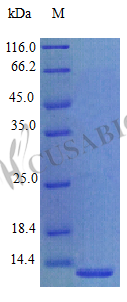Recombinant Human Prokineticin-1 protein (PROK1) is expressed in E. coli, covering the full length of the mature protein from amino acids 20 to 105. This tag-free protein achieves a purity greater than 98% as determined by SDS-PAGE and shows robust biological activity, with an ED50 of less than 2.0 μg/ml in a bovine EJG cell proliferation assay. It maintains an endotoxin level of less than 1.0 EU/μg, which appears to ensure high-quality research results.
Prokineticin-1 is a secreted protein known for its involvement in angiogenesis and modulation of gastrointestinal motility. The protein plays what seems to be a crucial role in various physiological processes, including the regulation of smooth muscle contraction and neurogenesis. Given its diverse functions, PROK1 has become a significant focus in research areas related to vascular biology and reproductive health.
Potential Applications
Note: The applications listed below are based on what we know about this protein's biological functions, published research, and experience from experts in the field. However, we haven't fully tested all of these applications ourselves yet. We'd recommend running some preliminary tests first to make sure they work for your specific research goals.
1. Cell Proliferation and Viability Assays
This recombinant PROK1 protein is confirmed to be biologically active (ED₅₀ < 2.0 μg/ml in bovine EJG cells) and can be used for proliferation studies. However, the relatively high ED₅₀ (μg/ml range vs ng/ml for many growth factors) suggests moderate potency, requiring careful dose optimization. Researchers should validate activity in human cell systems since the activity data comes from bovine cells, and species-specific differences in PROKR1/PROKR2 receptor affinity may exist. The high purity (>98%) supports reliable results, but the moderate specific activity (>500 IU/mg) indicates this protein may have lower biological potency than typical growth factors.
2. Receptor Binding and Signaling Studies
The protein is suitable for PROKR1/PROKR2 binding studies, but the high effective concentration (up to 2.0 μg/ml) suggests moderate receptor affinity. Binding assays should be designed with appropriate concentration ranges to accurately determine kinetic parameters. The tag-free design ensures authentic interactions, but researchers should validate binding characteristics in human receptor systems to complement the bovine cell activity data.
3. Antibody Development and Validation
This high-purity PROK1 serves as a good antigen for antibody development. However, antibodies should be validated against native human PROK1 from biological sources, as E. coli expression lacks potential post-translational modifications. The moderate potency may challenge functional antibody neutralization assays, requiring higher antibody concentrations for effective blocking.
4. Protein-Protein Interaction Studies
The biologically active PROK1 can be used for interaction studies, but the high working concentrations may increase the risk of non-specific binding in sensitive assays. Researchers should include rigorous controls and use appropriate detection methods for moderate-affinity interactions. The tag-free design minimizes artifacts, but the partial sequence (20-105aa) should be verified against full-length native PROK1 for comprehensive interaction mapping.
5. Pharmacological Research and Drug Screening
This PROK1 is suitable for drug screening, but the moderate potency and high effective concentrations may challenge high-throughput screening formats where lower potency compounds are preferred. Screening campaigns should include robust controls and secondary validation assays. The consistent activity supports reproducibility, but hit confirmation should include full dose-response curves due to the protein's moderate efficacy.
Final Recommendation & Action Plan
This recombinant human PROK1 protein demonstrates confirmed biological activity but with moderate potency (ED₅₀ < 2.0 μg/ml), requiring careful experimental design. For immediate use, first validate activity in human cell systems to complement the existing bovine cell data, as species-specific receptor differences may affect potency. Use concentrations in the 1-10 μg/ml range for initial experiments, but perform detailed dose-response optimization for each specific application. The high purity and low endotoxin support cell-based assays, but the moderate potency may limit sensitivity in some functional readouts. When developing antibodies, validate against native PROK1 from relevant human tissues to ensure biological relevance. For screening applications, the protein can identify PROK1 modulators, but prioritize compounds with activity significantly above the baseline 2.0 μg/ml efficacy threshold. The E. coli expression produces a non-glycosylated protein, which is likely appropriate as PROK1 is not heavily glycosylated, but critical findings should be verified with a mammalian-expressed protein when possible. Always include proper controls accounting for the moderate potency, and consider that different cell types may exhibit varying sensitivity to PROK1 stimulation based on PROKR1/PROKR2 expression levels.




